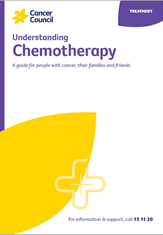- Home
- Chronic lymphocytic leukaemia (CLL)
- Treatment
- Chemotherapy and targeted therapy
Chemotherapy and targeted therapy for CLL
If you need treatment for chronic lymphocytic leukaemia (CLL), you will often have a combination of chemotherapy and targeted therapy drugs. Some people have targeted therapy drugs on their own.
Chemotherapy uses anti-cancer drugs called cytotoxics to kill the leukaemia cells or slow their growth. Targeted therapy drugs attack specific features of leukaemia cells to stop them growing and multiplying.
Learn more about:
- Different types of drugs for CLL
- Side effects of chemotherapy
- Taking care with infections
- Video: What is chemotherapy?
Different types of drugs for CLL
It is common to have chemotherapy and targeted therapy drugs through a drip into a vein (intravenous infusion) or as an injection. This is usually during a day visit to a treatment centre. Some drugs can be given as tablets that you take at home. What drugs you are offered will depend on the stage of the CLL, the results of genetic tests, and your age, health and personal preferences.
- If the CLL has no high-risk chromosomal abnormalities and you are fit and healthy – it is common to have a treatment called FCR, a combination of the chemotherapy drugs fludarabine and cyclophosphamide and the targeted therapy drug rituximab. The drugs are usually given over four days, followed by a rest period of a few weeks. This cycle is repeated up to six times.
- If you are older or have other medical issues – the FCR combination may cause too many side effects so you may be offered a less intense treatment plan. This may include a combination of the targeted therapy drugs venetoclax and obinutuzumab.
- If the CLL shows genetic changes or returns after initial treatment – you may be given other targeted therapy drugs. Options may include ibrutinib, acalabrutinib, venetoclax and obinutuzumab, or idelalisib plus rituximab.
- If the CLL returns after initial treatment – you may be offered different chemotherapy and targeted therapy drugs, such as ibrutinib, acalabrutinib or venetoclax.
There is a lot of research into CLL, and new drugs are regularly becoming available. Talk to your doctor about the latest developments and if there is a suitable clinical trial you can join.
During and after treatment for CLL, you will have regular check-ups with your doctor to monitor your health.
Video: What is chemotherapy?
Watch this short video to learn more about chemotherapy.
Podcast: Making Treatment Decisions
Listen now
More resources
Dr Chun Kei Kris Ma, Clinical Haematologist, Western Sydney Local Health District; Delphine Eggen, Consumer; Dr Robin Gasiorowski, Staff Specialist, Haematology, Concord Hospital; Karl A Jobburn, Haematology Clinical Nurse Consultant, Liverpool Hospital; Yvonne King, 13 11 20 Consultant, Cancer Council NSW; Heather Mackay, Clinical Nurse Consultant, Westmead Hospital; Jennifer Paton, Consumer.
View the Cancer Council NSW editorial policy.
View all publications or call 13 11 20 for free printed copies.
Need to talk?
Support services
Coping with cancer?
Ask a health professional or someone who’s been there, or find a support group or forum
Need legal and financial assistance?
Pro bono legal and financial matters, no interest loans or help with small business
Cancer information
Chemotherapy common questions
Addresses chemotherapy concerns such as pain, time and pregnancy
Making cancer treatment decisions
Decision-making steps, consent and second opinions


